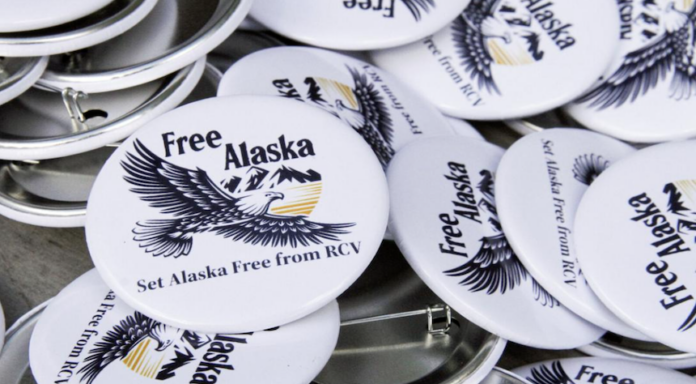The Alaska Supreme Court ruled for sanity despite a bitter battle waged by the Left and funded with money from outside of the Great Land. Alaska voters will have the opportunity to vote in November on an initiative that would repeal the ranked-choice voting scheme (RCV), as well as a jungle primary.
If we could only get Alaskans out to vote to end this stupidity.
Alaska Supreme Court confirmed on Thursday that a ballot measure to repeal Alaska’s system of ranked-choice elections will be put to a vote this November.
The court’s five judges issued a short order that upheld the decision of a lower court that certified Ballot Measure 2. This measure would repeal laws that established the state’s open primary and ranked-choice elections.
The order was issued shortly after the justices heard arguments in an appeal alleging that the Alaska Division of Elections had improperly certified the measure.
In an email, Senior Assistant Attorney Lael Harrison said, “Today the Court quickly confirmed that the Division of Elections correctly interpreted and applied the law in qualifying this measure for the November ballot.” The Department of Law thanks the Court for its timely review and ruling on this matter, well in advance of the Division’s deadline for printing ballots.
The primary for this year was held on 20 August under the “jungle system” and had a shockingly low turnout. The GOP ticket was split between Lieutenant Governor Nancy Dahlstrom and Nick Begich III. Democrat incumbent Mary Peltola received 50.39 percent, Begich 26.96, and Dahlstrom 19.97 percent. Begich promised to endorse his fellow Republican if she gained a higher vote share. Dahlstrom, however, has not made any such promises and is showing every sign that she will stick it out despite the demands on her Facebook page to drop out.

Even if Dahlstom remains in the race, Alaskans can still vote for the GOP if they follow the “rank red” rule, and give both GOP candidates a higher ranking than any other candidate.
Alaskans do need to vote. The repeal initiative should encourage more Alaskans to vote in the November general election.
Some people attribute the low primary turnout to a boring election.
Since 1994, Alaska’s primary ballot has not included a U.S. Senate or Governor’s race. Burke Croft said this could have contributed to a lower turnout.
John-Henry Heckendorn said, “It was like a historically boring election with nothing to do about who ran.”
Croft stated that, based on the data available, a greater proportion of Democrats or nonpartisans cast their votes early in the primaries than they did in previous elections. He assumes that more Democrats than expected participated in the primaries.
Let’s hope.
Mary Peltola’s first term was won in large part because she threw her support behind Senator Lisa Murkowski and her reelection campaign. Peltola could have benefited from Murkowski’s usual coalition between “soft” Republicans, moderate Democrats, and Murkowski. There is no doubt that she also benefited from RCV. She ran against two Republicans who split votes in part because of the confusing nature.
Other states are considering ranked-choice voting. Alaskans, I think it’s a terrible system. In theory, this system is supposed to increase the chances of third-party candidates. But in reality, it just undermines the principle of “one voter, one vote.” Alaskans should ditch this system in November and the rest of America should do the same.










